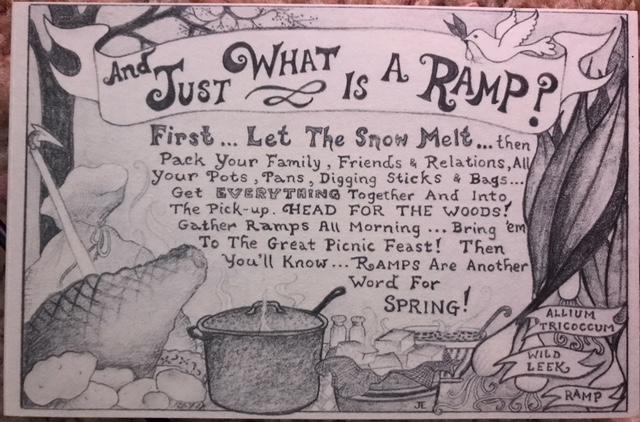I love when I can claim TV is a teaching tool. Before I saw this episode yesterday, I had never heard of this….
Jeremiah Stocker:
Know what a ramp is?
Karen Guilfoyle:
An inclined slope.
Jeremiah Stocker:
Nope. It’s kind of a bulb;
not quite onion, not quite garlic.
‘HAWKINS’“DIE, DARLING, DIE”
From Wikipedia:
Allium tricoccum (commonly known as ramp, ramps, spring onion, ramson, wild leek, wood leek, and wild garlic) is a North American species of wild onion widespread across eastern Canada and the eastern United States. Many of the English names are also used for other Allium species, particularly the similar Allium ursinum which is native to Europe and Asia.
According to West Virginia University botanist Earl L. Core, the widespread use in southern Appalachia of the term "ramps" (as opposed to "wild leek" which is used in some other parts of the United States) derives from Old English:
The name ramps (usually plural) is one of the many dialectical variants of the English word ramson, a common name of the European bear leek (Allium ursinum), a broad-leaved species of garlic much cultivated and eaten in salads, a plant related to our American species. The Anglo-Saxon ancestor of ramson was hramsa, and ramson was the Old English plural, the –n being retained as in oxen, children, etc. The word is cognate with rams, in German, Danish, Swedish, and Norwegian, and with the Greek kromuon, garlic [...]. Wright’s English Dialect Dictionary (1904) lists as variants rame, ramp, ramps, rams, ramsden, ramsey, ramsh, ramsies, ramsy, rommy, and roms, mostly from northern England and Scotland.
Chicago received its name from a dense growth of ramps near Lake Michigan in Illinois Country observed in the 17th century. The Chicago River was referred to by the plant's indigenous name, according to explorer Robert Cavelier, sieur de La Salle, and by his comrade, the naturalist and diarist Henri Joutel. The plant, called shikaakwa (chicagou) in the language of local native tribes, was once thought to be Allium cernuum, the nodding wild onion, but research in the early 1990s showed the correct plant was the ramp.
The ramp has strong associations with the folklore of the central Appalachian Mountains. Fascination and humor have fixated on the plant's extreme pungency. Jim Comstock, editor and co-owner of the Richwood News Leader, introduced ramp juice into the printer's ink of one issue as a practical joke, invoking the ire of the U.S. Postmaster General.
According to Jeremiah Stocker (Billy Jim Hawkins’ journalist nephew), if you eat 10 or 12 ramps at a ramp-fest, you’re not going to get along with anybody else unless they also ate 10 or 12 ramps.
Being a long-time fan of Tolkien's Middle-Earth and his use of philology, I like to think Hransa could be cribbed as an old Hobbit name which would eventually become the plant-based name Ramson (either as a first name or surname.)
Now I’m curious to try them!





No comments:
Post a Comment